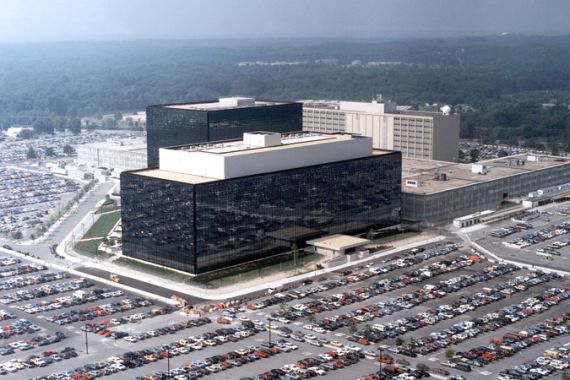US spy agency seeks criminal probe into leaks
Director of National Intelligence James Clapper accuses media of being “reckless” in revealing monitoring of internet.

A US intelligence agency has requested a criminal probe into the leak of highly classified information about secret surveillance programs run by the National Security Agency, a spokesman for the intelligence chief’s office said.
Confirmation that the NSA filed a “crimes report” came a few hours after the nation’s spy chief, Director of National Intelligence James Clapper, launched an aggressive defense of a secret government data collection program on Saturday.
Keep reading
list of 4 itemsHong Kong’s first monkey virus case – what do we know about the B virus?
Why will low birthrate in Europe trigger ‘Staggering social change’?
The Max Planck Society must end its unconditional support for Israel
Clapper blasted what he called “reckless disclosures” of a highly classified spy agency project code-named PRISM.
It was not known how broad a leaks investigation was requested by the super-secret NSA, but Shawn Turner, a spokesman for Clapper’s office, said a “crimes report has been filed.”
Over the last week we have seen reckless disclosures of intelligence community measures used to keep Americans safe,
The report goes to the Justice Department, which has established procedures for determining whether an investigation is warranted.
Prosecutors do not accept all requests, but they have brought a series of high-profile leak investigations under President Barack Obama. US officials said the NSA leaks were so astonishing they expected the Justice Department to take the case.
A Justice Department spokesman declined to comment.
In a statement earlier on Saturday, Clapper acknowledged PRISM’s existence by name for the first time and said it had been mischaracterized by the media. The project was legal, not aimed at US citizens and had thwarted threats against the country, he said.
“Over the last week we have seen reckless disclosures of intelligence community measures used to keep Americans safe,” Clapper said in a statement.
He said the surveillance activities reported in the Washington Post and Britain’s Guardian newspaper were lawful and conducted under authorities approved by Congress. “Significant misimpressions” have resulted from recent articles, he said.
Investigating leak
President Barack Obama’s national security spokesman Ben Rhodes said the administration was investigating whether the leak had put Americans or US interests in danger, implying that legal action may be considered.
“What we’re focused on doing right now … is frankly doing an assessment of the damage that’s been done to the national security of the United States by the revelations of this information,” he said.
The service providers – internet titans like Google, Yahoo! and Facebook – also hit back, insisting they had not given direct access to customer data.
“Press reports that suggest that Google is providing open-ended access to our users’ data are false, period,” Google’s CEO Larry Page and chief legal officer David Drummond said in a message on their official company blog.
“We had not heard of a program called PRISM until yesterday,” they said, adding: “We provide user data to governments only in accordance with the law.”
Facebook founder Mark Zuckerberg described the press reports as “outrageous,” insisting that his firm only provided user information to the authorities when compelled to by law. Yahoo! issued a similar denial.
“The notion that Yahoo! gives any federal agency vast or unfettered access to our users’ records is categorically false,” general counsel Ron Bell said.
“We do not voluntarily disclose user information. The only disclosures that occur are in response to specific demands.”
Court approved
Under PRISM, which has been running for six years, the US National Security Agency can issue directives to Internet firms demanding access to emails, online chats, pictures, files, videos and more uploaded by foreign users.
The initial press reports that revealed the secret program suggested the NSA had some form of back door access to the servers of firms including Microsoft, Yahoo, Google, Facebook, AOL, Skype, Apple, PalTalk and YouTube.
But Clapper’s statement described a system whereby the government must apply to a secret US court for permission to target individuals or entities then issue a request to the service provider.
“The government cannot target anyone under the court approved procedures … unless there is an appropriate, and documented, foreign intelligence purpose for the acquisition,” Clapper said.
Such a purpose, he continued, could be “the prevention of terrorism, hostile cyber activities or nuclear proliferation.”
He admitted that data on US citizens might be “incidentally intercepted” in the course of targeting a foreign national, but said this would not normally be shared within the intelligence community unless it confirmed a threat.